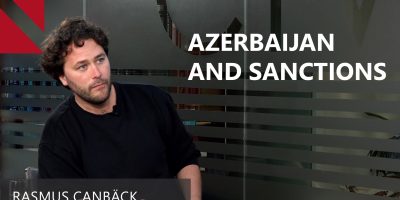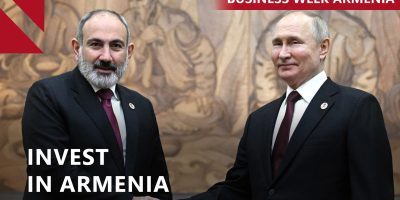Emil Sanamyan, editor of the USC Institute of Armenian Studies Focus on Karabakh platform and specialist on the South Caucasus spoke with CivilNet’s Karen Harutyunyan on the recent internal political developments in Armenia.
 K.H.: The Armenian government’s campaign against those it sees as having usurped their power positions in past years has reached Gagik Tsarukyan, the leader of the Prosperous Armenia Party, with whom Pashinyan was initially getting along well. Why, do you think, controversies arose between him and Tsarukyan?
K.H.: The Armenian government’s campaign against those it sees as having usurped their power positions in past years has reached Gagik Tsarukyan, the leader of the Prosperous Armenia Party, with whom Pashinyan was initially getting along well. Why, do you think, controversies arose between him and Tsarukyan?
E.S.: I expected this campaign from the beginning, because Pashinyan’s agenda has focused on both power and wealth redistribution in Armenia, and Tsarukyan is seen as one of the most publicly wealthy people in the country, who was also plugged in into the old power structures. Initially, Tsarukyan’s support was key for Pashinyan to be elected prime minister and later to dissolve the parliament and to make sure to keep Republicans out of the new parliament. But once those goals were accomplished, Tsarukyan’s time was up. Specific timing may have something to do with the recent court decision to release Kocharyan on bail. Perhaps, expecting that decision, Pashinyan thought he needed to show decisiveness and move against Tsarukyan.
K.H.: Pashinyan seems to have accumulated many enemies with almost no allies left, except his strong but shrinking electorate. He even antagonized groups and individuals that had become loyal to him after the revolution, such as the clergy, the head of the Constitutional Court, and even civil society groups. How do you explain such behaviour?
E.S.: I think this is a continuation of Pashinyan’s work style that people were familiar with from his time as newspaper editor and opposition member of parliament. He is prone to conflicts and not very good at compromising. Particularly, now, when he has virtually unchecked power to order criminal investigations, dispatch National Security Service (NSS) to people’s homes and pressure courts to jail those he believes should be in jail, he is using and abusing that power. Theoretically, the only people who could check this power are members of the parliamentary majority, but so far his political party members have shown that just as their predecessors, they value political loyalty over rule of law.
K.H.: Pashinyan replaced the heads of both police and the National Security recently, which many observers see as a move to consolidate his power, as the former elites consolidate their resources against the government. What is your opinion about this?
E.S.: Yes, certainly, just as his predecessors, Pashinyan wants to have loyal chiefs of NSS and police. He is suspicious of all those who worked for previous governments and even many of his recent allies, so he will seek to promote people from outside these structures and little-known to the public and more directly loyal to him. Remember that even Serzh Sargsyan appointed his aide Georgi Kutoyan, who never worked in NSS, as its head, and Vigen Sargsyan to head the Defense Ministry. I have to note that so far Pashinyan has not done this with the military, where people he promoted are well-respected members of that institution. He also essentially acquiesced to the balance of power in recent elections in Artsakh.
K.H.: Coronavirus has become the biggest enemy of the current government. How do you think it will impact the internal political developments and economy?
E.S.: Every new administration of Armenia was confronted with a crisis: economic collapse and war for Ter-Petrossian, the 1998 financial crisis and October 27 for Kocharyan, and 2008 economic crisis for Serzh Sargsyan. The COVID-19 pandemic is emerging as a singular test for Pashinyan and not unexpectedly, like many other leaders around the world, he is struggling to confront it effectively, and economic effects will be felt for years to come. This no doubt will hit at his main “crypto-currency” – his public popularity – and will open the way for other populists to challenge him politically.
K.H.: Does Robert Kocharyan’s release from detention fit any of these developments?
E.S.: At this point it is not yet clear if Kocharyan will be released from detention, as the bail amount put at $4.2 million will not be easy to meet. And even if it is met, I can see Pashinyan finding another judge who could again jail Kocharyan, as already happened twice before. Most likely, this conflict will persist as long as Pashinyan is in power, as was the case between Ter-Petrossian and the Dashnaks throughout the 1990s.
K.H.: In an unexpected move, Nikol Pashinyan cancelled his scheduled trip to Moscow to participate in the 75th anniversary celebrations of World War II or the Great Patriotic War, on June 24. His decision was preceded by reception of Prosperous Armenia party members at the Russian embassy in Yerevan. Do you see any connection?
E.S.: I don’t think there is a direct connection to the embassy meeting. I think it is more likely it had to do with the itinerary in Moscow and impossibility of Pashinyan’s direct meeting with Putin, due to the former’s still recent COVID infection and Putin being 67 years old.
















